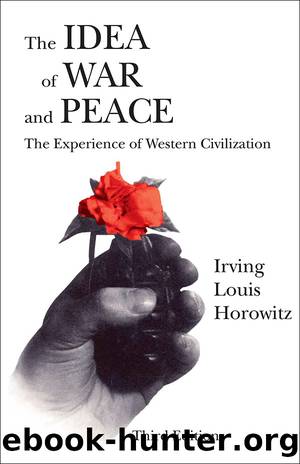The Idea of War and Peace: The Experience of Western Civilization by Irving Louis Horowitz

Author:Irving Louis Horowitz [Horowitz, Irving Louis]
Language: eng
Format: epub
Tags: Technology & Engineering, Political Science, Military Science, General
ISBN: 9781351481175
Google: nxwuDwAAQBAJ
Goodreads: 35865085
Publisher: Routledge
Published: 2006-11-13T00:00:00+00:00
8
Emery Reves: Universal Commonweals
The roots of universalism, or as it is commonly called, federalism, are ancient and honorable. The first developed expression of it came with the sophists, particularly Hippias of Elis, who initiated the conception of world citizenship. Universalism was linked to the issue of war and peace by the leading representative of Cynic thought, Antisthenes. In addition to his equalitarian sentiments, he asserted that the wise man, whatever his economic rank may be, is at home anywhere. From this he went on to say that the flowering of a world of wise men required a harmonious world in which the artificial barriers of polity and economy would be shattered.
The Humanist, Renaissance and Enlightenment theorists vigorously pursued the universalism of ancient political philosophy. The impassioned statement for world government presented by the French philosopher, Volney, typified the best of Enlightenment opinion. âLet us banish all tyranny and all discord; let us form but one society, one great family; and since human nature has but one constitution, let there exist in the future but one law, that of nature; one code, that of reason; one throne, that of justice; one altar, that of union.â1 In an America that had just gained its sovereignty in the struggle against English dominion, Washington was still able to speak as a citizen âof the great republic of humanityâ trying to find ways in which âmankind may be connected like one great family in fraternal ties.â2 Expressions of political interdependence spread with the industrial revolution. However, it received particular stress in Germany, despite its economic backwardness at the time of Herder and Kant. The former wrote of âthe steady desire for cooperation, for a close union which would make nations ready to protest together against any unlawful action of which a member state might be found guilty.â Herder adds a postscript that could profitably be listened to by prophets of armed peace. âFor a cultured nation an olive branch means more than a laurel wreath.â3 Kant in turn carried the concept of federalism to its historical conclusion, pacifism. âReason on the throne of the highest moral law-giving power, absolutely condemns War as a mode of Right, and, on the contrary, makes the state of Peace an immediate duty. But the state of peace cannot be founded or secured without a compact of the Nations with each other. Hence there must be a compact of a special kind which may be called a pacific federation, and which would be distinguished from a mere treaty or Compact of Peace in that the latter merely puts an end to one war whereas the former would seek to put an end to all wars forever.â4
In Emery Reves, contemporary universalism has an able, if limited, theorist. His premises are throughout connected to a presentation and defense of the ideal of peace, and more profoundly, of the traditional liberal social values inherited from Locke, Kant and Mill. The great conflict is conceived by Reves to be between the Leviathan and the Individual.
Download
This site does not store any files on its server. We only index and link to content provided by other sites. Please contact the content providers to delete copyright contents if any and email us, we'll remove relevant links or contents immediately.
The Radium Girls by Kate Moore(12028)
100 Deadly Skills by Clint Emerson(4925)
Rise and Kill First by Ronen Bergman(4788)
The Templars by Dan Jones(4689)
The Doomsday Machine by Daniel Ellsberg(4490)
The Rape of Nanking by Iris Chang(4213)
Killing England by Bill O'Reilly(4001)
Stalin by Stephen Kotkin(3965)
Hitler in Los Angeles by Steven J. Ross(3946)
12 Strong by Doug Stanton(3550)
Hitler's Monsters by Eric Kurlander(3342)
Blood and Sand by Alex Von Tunzelmann(3203)
The Code Book by Simon Singh(3189)
Darkest Hour by Anthony McCarten(3133)
The Art of War Visualized by Jessica Hagy(3007)
Hitler's Flying Saucers: A Guide to German Flying Discs of the Second World War by Stevens Henry(2754)
Babylon's Ark by Lawrence Anthony(2678)
The Second World Wars by Victor Davis Hanson(2524)
Tobruk by Peter Fitzsimons(2517)
